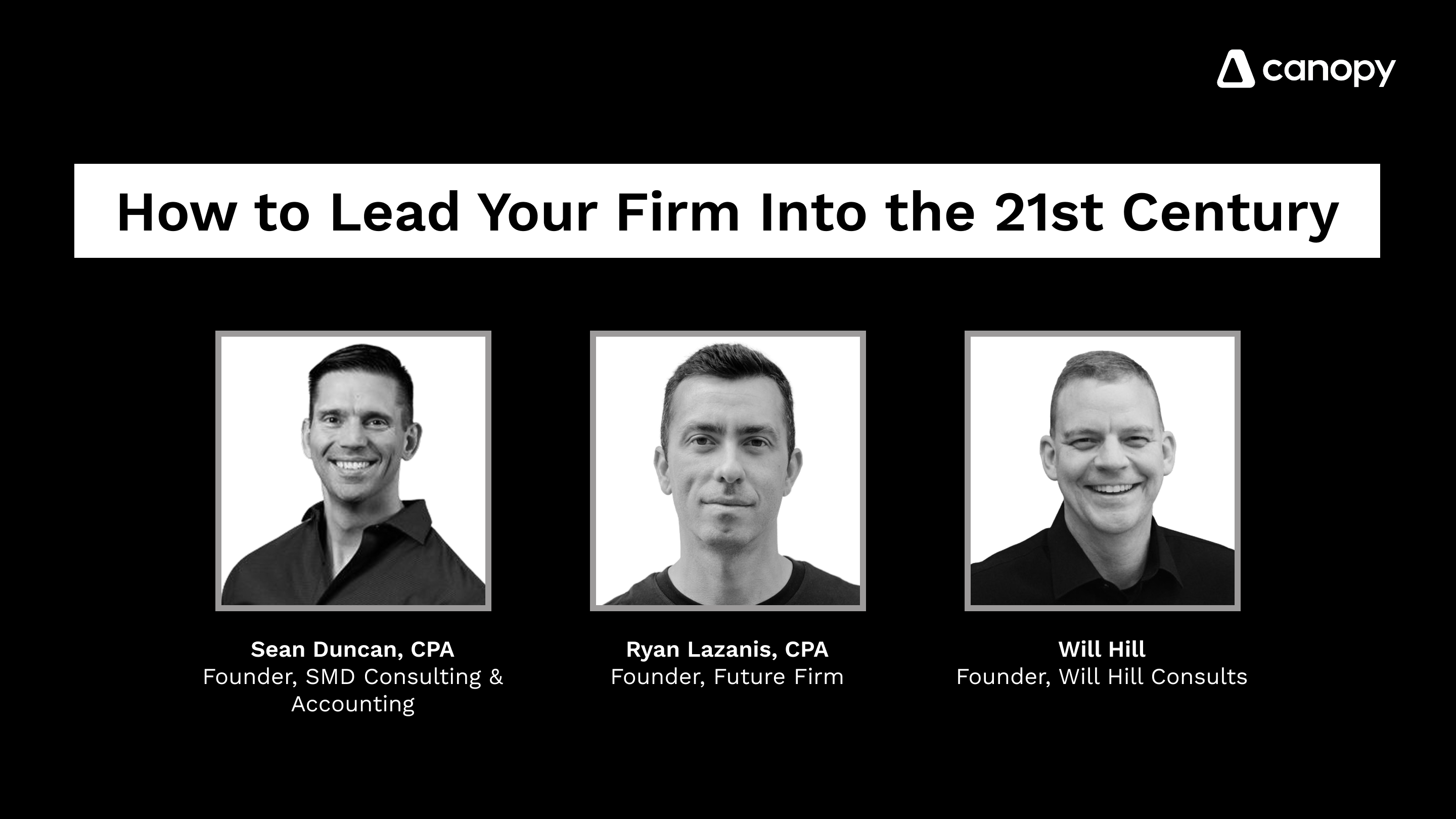As the tax and accounting landscape becomes increasingly complex, accountants and CPAs are relying on advanced tax software to streamline their workflows, improve accuracy, and enhance the client experience. Tax software for accountants has evolved in recent years to not only address tax preparation and compliance but also open the door to lucrative and meaningful work in advisory services. By harnessing the power of automation, integration, and AI-driven tools, today’s tax software for accountants empowers firms of all sizes to stay competitive in a fast-paced industry.
But how do you choose the best tax software for CPAs and small accounting firms, ensuring you have the insights needed to optimize your firm’s operations? Let’s take a look at the various types of tax software accountants use, what makes these tools indispensable, and how Thomson Reuters tax software rises to the top as the premier solution for elevating your practice.
Jump to ↓
What software do CPAs use for taxes?
The game changer: Integrated tax software for accountants
What tax software do most accountants use?
What’s the best tax software for CPA firms?
What’s the best tax software for a small accounting firm?
How to choose the right tax software for accountants
What software do CPAs use for taxes?
The types of tax software for accountants encompass a range of tools designed to handle different aspects of the tax and accounting workflow. CPAs typically use several types of software to cover various needs, including:
1. Tax preparation software
Advanced tax preparation software offers accountants a suite of tools designed to streamline workflows, improve accuracy, and enhance client service. By automating complex calculations and integrating seamlessly with tax research platforms, these solutions reduce the risk of errors and ensure compliance with the latest tax regulations.
Features like e-filing, document management, and client portals enable accountants to save time and collaborate more effectively with clients, while data analytics and reporting tools provide insights that support proactive tax planning. Additionally, advanced software often includes AI-powered capabilities, such as automatic form population and anomaly detection, further enhancing efficiency and enabling accountants to focus on high-value advisory services.
2. Tax planning software
Advanced tax planning software empowers accountants to deliver strategic, value-driven services by providing powerful tools for forecasting, scenario analysis, and personalized client recommendations. With features like real-time tax code updates, dynamic modeling, and integration with financial data, these solutions help accountants identify opportunities to minimize tax liabilities while ensuring compliance.
The software’s ability to simulate various tax strategies enables accountants to present clients with clear, actionable insights tailored to their financial goals. Furthermore, advanced planning tools enhance client relationships by showcasing accountants as proactive advisors who deliver measurable results, while automation reduces manual effort, freeing up time for deeper client engagement and strategic planning.
3. Research and compliance tools
Tax research and compliance tools offer significant benefits for accountants by streamlining workflows, ensuring accuracy, and reducing the risk of costly errors. These tools provide instant access to up-to-date tax laws, regulations, and guidance, helping accountants stay ahead of frequent changes and complex compliance requirements.
By harnessing the power of AI and machine learning, these tools can enhance an accountant’s ability to deliver precise answers and actionable insights, boosting efficiency and client satisfaction—and simplifying data analysis. The result is more time and transformative insight that enables a focus on higher-value activities, such as strategic planning and advisory services.
4. Client collaboration software
Client collaboration software provides numerous benefits for accountants by fostering seamless communication and improving overall client engagement. This software enables real-time document sharing, secure file exchanges, and easy access to important tax or financial information, making it easier for accountants and clients to collaborate efficiently.
By enhancing transparency, clients can track the progress of their financial matters, while accountants can provide updates and respond to queries promptly. With features such as task management, digital signatures, and cloud-based access, client collaboration software also improves workflow and reduces administrative burdens. This leads to stronger client relationships, higher satisfaction, and the ability for accountants to offer more personalized and proactive advisory services.
5. Workflow automation software
Workflow automation software offers accountants a range of benefits, primarily by enhancing efficiency and reducing the time spent on manual tasks. By automating repetitive processes such as data entry, document management, and client communication, accountants can streamline their workflows and focus on higher-value activities like analysis and client advisory.
Automation ensures greater accuracy by minimizing human error, which is crucial in the high-stakes world of finance and tax. Additionally, workflow automation software improves collaboration among team members, as it centralizes tasks and allows for better tracking of progress and deadlines. The increased productivity and improved accuracy ultimately lead to enhanced client satisfaction and more time for accountants to grow their practices.
The game-changer: Integrated tax software for accountants
The integration of all the aforementioned tax software is a game-changer for accountants and CPAs. Integrated tax software offers significant advantages for accountants by consolidating multiple essential tools into a unified platform, boosting efficiency and accuracy. The seamless integration of tax preparation software with research tools ensures that accountants have access to the latest tax laws, regulations, and guidance while preparing returns, thus saving time and minimizing the risk of errors.
Together, workflow automation features streamline tasks such as data entry, document management, and review processes, saving valuable time. Integrated client collaboration tools allow for real-time communication and secure document sharing, enhancing client engagement and transparency.
Perhaps most importantly, integrated tax software ensures compliance by automatically updating to reflect the latest tax changes and regulatory requirements, helping accountants stay ahead of evolving tax laws. All-in-one tax software for accountants not only simplifies tax preparation but also improves productivity, accuracy, and client satisfaction, allowing accountants to shift their focus to delivering strategic and personalized client advisory services.
What tax software do most accountants use?
For most firms, the choice of tax software depends on your firm’s size, budget, specialization, and workflow needs. But it is important to remember that you get what you pay for—meaning the cost of advanced compliance and integration features that come with comprehensive, professional-grade solutions offer a peace of mind and security that lower cost options may not provide.
Accountants typically gravitate toward tax software solutions that offer robust features, scalability, and reliability. While there are numerous options in the market, Thomson Reuters tax software solutions exemplify these attributes, making them a preferred choice for many accounting professionals as they cater to firms of all sizes, providing solutions for tax preparation, research, compliance, and advisory services.
What’s the best tax software for CPA firms?
The best tax software for CPA firms depends on the firm’s size, specialization, and workflow needs, while also addressing the firm’s unique challenges.
The Thomson Reuters integrated suite of products offers end-to-end solutions that streamline and enhance every stage of an accountant’s workflow. Powerful AI tools and best-in-class content for tax, accounting, and audit professionals increase efficiency, mitigate risk, and provide premium client services with enhanced data analytics and expert insights.
From tax preparation with UltraTax CS to strategic planning with Planner CS and in-depth research using Checkpoint Edge, these tools work seamlessly together to maximize efficiency and accuracy. With flexible workflows and customizable reporting capabilities, firms can tailor the software to meet their unique needs, adapting it to their specific processes and client demands.
Comprehensive training, robust customer support, and regular industry updates ensure that accounting teams stay ahead of regulatory changes and technological advancements, empowering them to deliver exceptional service and drive firm growth.
In addition to tax software, transitioning to an advisory services business model can help you increase your firm’s value and better serve your clients. Practice Forward provides a proven roadmap for your accounting firm to get paid for the valuable knowledge, advice, and strategies you provide your clients.
What’s the best tax software for a small accounting firm?
For small accounting firms, affordability and ease of use are critical. However, cutting corners on software can lead to inefficiencies and errors. Thomson Reuters solutions, while premium, offer unmatched value through their comprehensive features and seamless integration.
In particular, small accounting firms benefit greatly from using quality tax software and automation tools, as these solutions enhance accuracy, efficiency, and overall productivity while reducing the risk of errors. Tax preparation software, such as UltraTax CS, simplifies even the most complex returns by automating calculations and ensuring compliance with the latest tax laws.
Research tools like Checkpoint Edge allow accountants to quickly access up-to-date regulations and guidance, helping them make informed decisions and provide strategic advice to clients. Workflow automation tools streamline processes like data entry, document management, and task tracking, ensuring deadlines are met and enabling seamless collaboration across teams.
For client communication, integrated solutions like Practice CS provide secure file sharing, real-time updates, and centralized client management. Together, these tools create a unified, efficient workflow, enabling accountants to focus more on high-value services such as advisory work, while delivering superior results for their clients.
Small firms can benefit from a free trial of Thomson Reuters tax software to experience firsthand how these integrated tools enhance efficiency and accuracy, particularly for small firms.
How to choose the right tax software for accountants
When evaluating tax software, accounting firms of all sizes should consider these tips:
Assess your needs. Start by identifying the specific areas of your workflow that require improvement. Are you struggling with manual tax preparation, disorganized planning processes, or keeping up with compliance updates? Do you need better tools for client communication or seamless integration across all tasks? Understanding your pain points will help you prioritize features and functionality in the software you choose.
Focus on integration. A unified tax software ecosystem is critical for efficiency. Look for software that integrates seamlessly across tools like tax preparation, planning, research, workflow automation, and client collaboration. For example, products like UltraTax CS and Checkpoint Edge work together to ensure a smooth transition from preparing returns to conducting research and delivering advisory services, saving time and reducing errors.
Evaluate scalability. Your firm’s needs today may not reflect what you’ll require in the future. Choose tax software that can scale with your business, accommodating more clients, new service offerings, and growing teams. Scalability ensures your investment remains viable as your firm evolves.
Test usability. Take advantage of free trials or demo versions to ensure the software is user-friendly and fits your firm’s workflows. Pay attention to the learning curve, ease of navigation, and the availability of training resources. A robust yet intuitive platform will be easier to adopt across your team and improve productivity right away.
Consider reviews and ratings. Researching reviews, industry recognition, and customer testimonials can offer valuable insights into the software’s performance, reliability, and support. Look for products endorsed by industry leaders or with proven track records of success among firms similar to yours. Tools like UltraTax CS are widely trusted and praised for their comprehensive features and professional-grade reliability.
Thomson Reuters tax software consistently stands out as an industry-leading solution for its features, reliability, and value in managing complex tax scenarios, maintaining compliance, and fostering client relationships. These tools are designed to integrate seamlessly, providing a comprehensive and efficient workflow for CPAs and accounting firms.
A strategic investment in your firm’s success
The right tax software for accountants is more than a tool—it’s a strategic investment in your firm’s success. Whether you’re looking to streamline tax preparation, improve client collaboration, or enhance compliance, Thomson Reuters offers a suite of solutions tailored to your needs.
To explore how Thomson Reuters tax software can transform your practice, visit our tax software page to find the right product for you and request a free trial today.


























